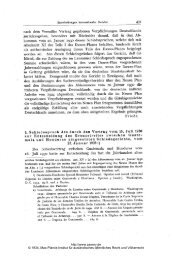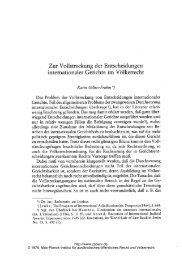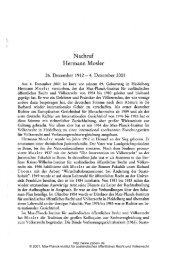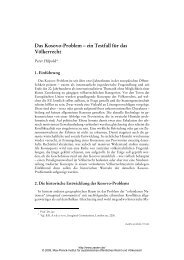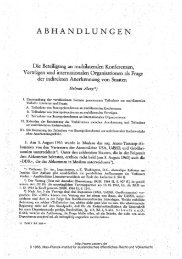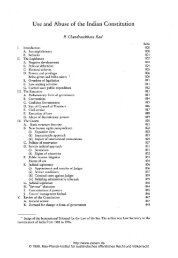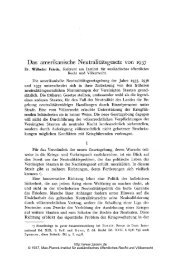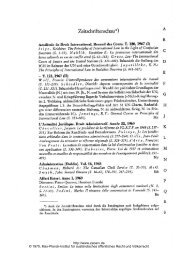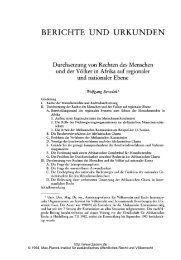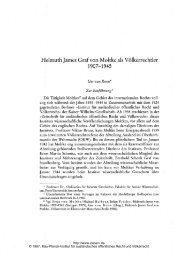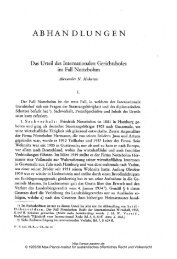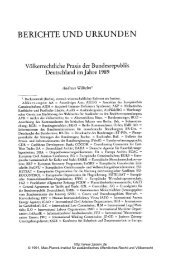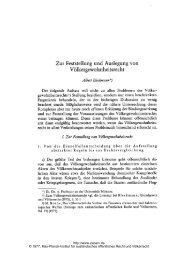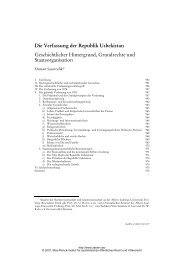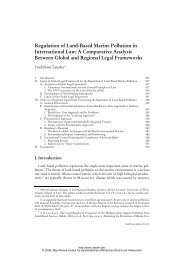"obligatorische" Gerichtsbarkeit des Internationalen Gerichtshofs
"obligatorische" Gerichtsbarkeit des Internationalen Gerichtshofs
"obligatorische" Gerichtsbarkeit des Internationalen Gerichtshofs
Erfolgreiche ePaper selbst erstellen
Machen Sie aus Ihren PDF Publikationen ein blätterbares Flipbook mit unserer einzigartigen Google optimierten e-Paper Software.
Die obligatorische <strong>Gerichtsbarkeit</strong> <strong>des</strong> <strong>Internationalen</strong> <strong>Gerichtshofs</strong> 263<br />
S urnmary<strong>"</strong>;<br />
The <strong>"</strong>;Compulsory<strong>"</strong>; jurisdiction of the IQJ<br />
Reflections on the Decision of the Court in the<br />
US-Nicaragua Case<br />
I. Thepresent article concerns questions of jurisdiction of the International<br />
of November 26,1994 in the<br />
Case concerning <strong>"</strong>;Military and Paramilitary Activities-in and against Nicaragua<strong>"</strong>;.<br />
As the United States retired from the proceedings after the positive.judgment of, the<br />
Court of Justice (ICJ) arising out of its judgment<br />
Court on jurisdiction and admissibility,<br />
the author first examines whether such<br />
retirement was legal on the ground of nullity of. the judgment. In this context the<br />
article critically retraces the findings of the Court on various questions of jurisdic-<br />
tion.<br />
and 5 of the Statute of the Court was<br />
1. -The ju,risdiction under Art.36 paras.2<br />
accepted by the Court by including in the provision of transfer of.,the jurisdiction<br />
from the Permanent Court of International Justice (PCIJ) to the ICJ (Art.36<br />
para. 5) not only b i n d i n g but also merely v a I i d declarations. Since the declaration<br />
of Nicaragua under Art.36 para.2 of the PCIJ Statute required special ratifica-<br />
tion and since Nicaragua had never ratified it the declaration of Nicaragua was, at<br />
the time of the creation of the ICJ, a valid but not binding declaration which had<br />
not expired. According to the Court the ratification lacking under the PCIJ Statute<br />
was fulfilled when Nicaragua ratified the Charter of the UN of which the Statute of<br />
the ICJ is an integral part. These findings of the Court are in the author's opinion<br />
unconvincing but nevertheless valid because nullity of the judgment would have<br />
required an interpretation of Art.36 para.5 of the ICJ Statute manifestly con-<br />
trary to the text. So there is a decision binding upon the United States founding the<br />
Court's jurisdiction on the optional clause.<br />
2. On this basis the further argument of the Court concerning acquiescence as<br />
of the<br />
to the binding character of the Nicaraguan declaration under Art.36 para.2<br />
PCIJ Statute because of the fact that Nicaragua was always cited in the publications<br />
of the Court as a State bound under Art.36 para.2 is regarded in this article not<br />
only as superfluous but also as unconvincing in the light of the basic principle of<br />
unambiguous consent to international jurisdiction.<br />
3. The tentative of the United States to withdraw their declaration of 1946 by a<br />
letter aiming at immediately changing this declaration <strong>des</strong>pite the time-limits con-<br />
*<br />
Summary by the author.<br />
http://www.zaoerv.de<br />
© 1987, Max-Planck-Institut für ausländisches öffentliches Recht und Völkerrecht



